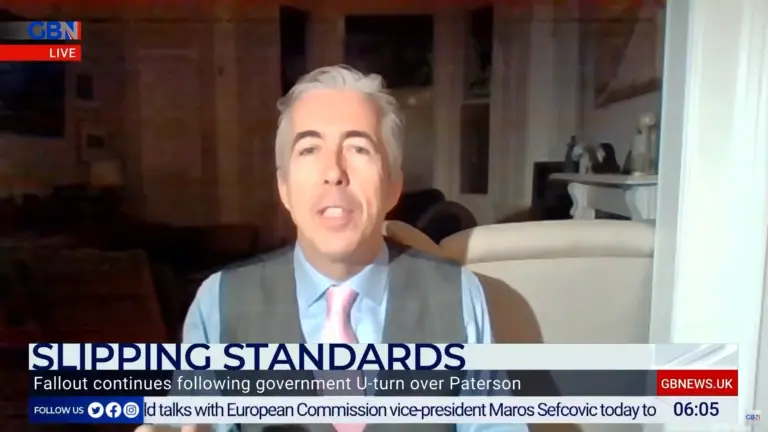For me one regret of the whole Owen Paterson affair is that the legitimate need to reform the way that the MPs are disciplined and to introduce a better appeal system for them (something I strongly believe is needed) has been damaged by the way it was with no warning or much forethought attached to one MP’s individual situation.
For those of us familiar with the lobbying sector in the UK, his actions were always going to be very hard to justify and it is no surprise that the House of Commons Standards Committee found against him. Members of Parliament are elected to the House of Commons by their constituents and they are there to serve them. They are not sent to Parliament to lobby for commercial interests paying them additional sums on top of their MP salary.
Paid advocacy or lobbying by Members of Parliament for businesses with which MPs have a financial entanglement is wrong and very bad for public trust in our democratic institutions. Not many people are aware of the Transparency of Lobbying, Non-party Campaigning and Trade Union Administration Act which made it onto the statute book in 2014 – often called the Lobbying Act. This legislation by no means completed the job of making lobbying in the UK fully transparent and open but at least it was a start. Yet the whole thing feels like a waste of time if MPs are going around using their position in Parliament to push the causes of those paying them additional salaries. Outside jobs are allowed (again in my view rightly) but not lobbying or paid advocacy jobs. So it was always going to be very difficult for Owen Paterson to escape serious sanction – a view shared by many Conservatives as well as Opposition politicians.
One of the requirements emanating from the 2014 legislation it is that commercial consultancies such as PLMR have to sign up to the lobbying register and declare when our consultants meet with Government Ministers and Permanent Secretaries. It was a great start to reform but remains incomplete – it does not cover many people involved in lobbying in the UK including lawyers and management consultants, let alone in-house staff. So you end up with the situation where a consultancy such as PLMR, which undertakes a lot of lobbying and political campaigning as part of our broader overall communications offering to clients countrywide, operates to a much higher level of scrutiny and transparency than many other lobbyists – including in this case a serving Member of Parliament and former Member of the Cabinet.
PLMR was the first agency in the UK to sign up to the statutory Register of Consultant Lobbyists which requires consultant lobbyists to register quarterly the name of clients for whom they have made personal representations to Ministers and Permanent Secretaries. The definition of lobbying and scope of registerable activity was laid out in the Lobbying Act and in subsequent Guidance from the Lobbying Registrar. PLMR has always been an advocate for transparency across our sector and we willingly publish who we lobby for and have long subscribed to voluntary codes of conduct. A key change needed to the Act is to broaden its scope because too many people and institutions who lobby can still do so without it being transparent.
There are many other things needed to make lobbying even more open. In some ways the timing of the events in Parliament in this week was very appropriate coming as it did straight after the latest report from the Committee on Standards in Public Life — which advises the Prime Minister on ethical standards. Its foreword says:
Four areas require attention. The regulation of the Ministerial Code needs greater independence as it lags behind similar arrangements for MPs, peers, and civil servants. The scope of the Business Appointment Rules should be expanded and the rules should be enforced through legal arrangements. Reforms to the powers of the Commissioner for Public Appointments would provide a better guarantee of the independence of assessment panels. Transparency around lobbying is poor, and requires better co-ordination and more consistent publication by the Cabinet Office.
I hope the Prime Minister and his team take a proper look at it.
At the same time, we do need to improve the right of appeal for Members of Parliament when they are accused of wrongdoing. We also need to shed a lot more light on the work of the Parliamentary Commissioner for Standards – who is supposed to be an independent officer of the House of Commons. The current Commissioner is Kathryn Stone OBE. How does she go about her work? How does she achieve balance? Who holds her to account? How do we know she is treating MPs fairly? What recourse does an MP have when they take issue with Kathryn Stone’s approach? These are also legitimate questions but should not have been conflated with this one individual case.
As I came off air this morning from talking about these issues on GB News I had a number of final thoughts on the events of the last 48 hours
- I feel sorry for Owen Paterson and his family who have been through a dreadful few years with the loss of his wife.
- Owen Paterson’s work for Lynn’s Country Foods and Randox does not look appropriate by any measure
- More still needs to be done on transparency of lobbying.
- A by-election approaches in the North Shropshire seat where Owen Paterson enjoyed an enormous majority of 22,949 over Labour at the last election, up from a mere 2,000 when he first won in 1997. The Lib Dems will fancy their chances and it is highly unlikely a unity anti sleaze candidate will emerge given the recent result in Amersham and Chesham where a Conservative majority similar to this one was overturned. Both Labour and the Lib Dems are likely to want to have a serious crack at winning this constituency.





